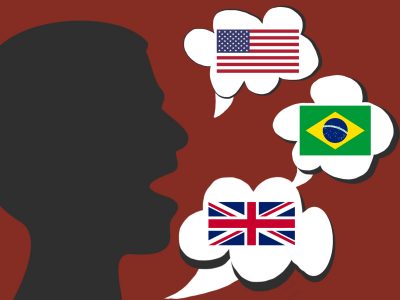There is a certain privilege that comes with an adoption of the all-American, television voice accent. It allows one to become integrated, accepted and designated a “good immigrant.” But, when an English speaker has a foreign accent — especially when said immigrant is non-white — it becomes automatically otherized and linguistically profiled.

Professor John Baugh, a renowned linguist currently teaching at Washington University in St. Louis, defines linguistic profiling as “racial identification based on speech.” However, this definition can be expanded to include other social characteristics —such as ethnicity, nationality, gender and sexuality — which are often detected or assumed through auditory cues.
Baugh conducted an experiment wherein he and his team posed as prospective renters. They called landlords advertising properties in five different geographic areas differing in both racial and socioeconomic demographics. His team adopted the respective Latinx, African American and Standard American English dialects/accents, so as to distinguish the impact of the accents on their interactions with the varying landlords.
The results of these experiment series indicated there was a generalized preference for the Standard American English accent, with the two non-white accents — Latinx English and African American English facing a distinct disadvantage when it came to securing the apartment lease.
A similar study was conducted by Jeffrey Grogger, a current Urban Policy Professor at The University of Chicago. His experiment called on participants to identify race from an audio recording. The results concluded that individuals were often able to correctly identify one’s race, although not necessarily their level of education or region of origin.
Moreover, a perhaps even more critical finding of Grogger’s was that Black participants that were identifiably Black in their audio recording were earning 12% below participants that were Black but not identifiably so in their recordings. Those who were not identified during their recording were able to earn as much as their white counterparts.
Both Grogger’s and Baugh’s studies point to a larger issue of linguistic profiling, one that has only become more pronounced the more that dialects and accents have been developed by minorities. Ultimately, the reality in today’s day and age is that speaking English is no longer enough.
Though xenophobic groups have infamously called for migrants to learn English as a result of migrating to this nation,that is not actually all that is demanded of them.
“You don’t have an accent!” — The excited praise with which white Anglo-Saxons and native speakers deliver these words would be enough to fool one into believing that it is truly worthy of celebration. This is not a reflection of any one interaction or individual, but rather the common manifestation and shared experience of a larger issue.
The danger of a pronounced foreign accent is not to be undermined in the context of an intrinsically white-supremacist society. Although a foreign accent inherently points to the sheer intellectual capabilities of an individual to learn a language besides their mother tongue, it also serves as a beautiful reminder of their heritage and identity. These traits are often ignored in Anglo-Saxon nations, and many migrants with foreign accents are met with hate crimes, prejudice and discrimination as a product of weaponized linguistic profiling.
Whether one’s accent is a reflection of their race, gender, ethnicity, nationality, sexuality or migration, it is an incomparable piece of their identity and heritage. But linguistic profiling need not be the weapon, it is still a useful community tool for identifying those that may have shared experiences, heritage and identities to us.
However, we as a community-at-large, must move away from celebrating a forced conformity to traditional Anglo-Saxon or heteronormative voices and instead towards a celebration of the cultural diversity embedded in our unique voices, dialects and accents.

























































































































